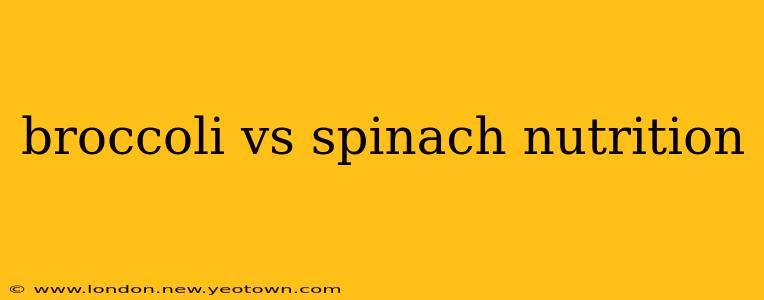The leafy green aisle can be a battlefield of healthy choices. Today, we're pitting two nutritional powerhouses against each other: broccoli and spinach. Both are packed with vitamins, minerals, and antioxidants, but which one reigns supreme? Let's dive into the details and discover which leafy green champion best fits your nutritional needs.
This isn't about declaring a definitive "winner," but rather understanding the nuanced nutritional profiles of these incredible vegetables and how their different strengths can benefit your diet. Think of it as choosing the right tool for the job – both broccoli and spinach are valuable, just in different ways.
Broccoli: The Vitamin C Champion
Imagine a tiny, green tree, bursting with nutrients. That’s broccoli, a cruciferous vegetable boasting an impressive array of health benefits. My grandmother always said, "Eat your broccoli, it’ll make you strong!" And she wasn't entirely wrong.
Broccoli shines with its high Vitamin C content. Vitamin C is a potent antioxidant, protecting your cells from damage caused by free radicals. It's also crucial for immune function, collagen production (essential for skin and bone health), and iron absorption.
Beyond Vitamin C, broccoli is a good source of:
- Fiber: Crucial for digestive health and keeping you feeling full and satisfied.
- Vitamin K: Essential for blood clotting and bone health.
- Potassium: Important for maintaining healthy blood pressure.
- Sulforaphane: A powerful compound with anti-cancer properties.
Broccoli's unique selling point? That would have to be its impressive sulforaphane content. This phytonutrient is linked to a reduced risk of several cancers and possesses anti-inflammatory properties.
Spinach: The Iron Giant
Popeye's secret weapon wasn't just clever marketing; spinach truly is an iron powerhouse. Iron is crucial for carrying oxygen throughout your body, making it vital for energy production and overall health.
While spinach’s iron content isn't as readily absorbed as that found in animal products (due to the presence of oxalates), it still provides a significant contribution, especially when paired with vitamin C-rich foods like… you guessed it, broccoli!
Beyond its iron content, spinach boasts:
- Lutein and Zeaxanthin: Powerful antioxidants that protect eye health, particularly against age-related macular degeneration.
- Beta-carotene: A precursor to Vitamin A, important for vision, immune function, and cell growth.
- Vitamin K: Like broccoli, spinach is also a great source of Vitamin K.
- Magnesium: Essential for muscle and nerve function, blood sugar control, and blood pressure regulation.
Spinach's winning attribute? Its incredible concentration of lutein and zeaxanthin, making it a true champion for eye health.
Which One Should You Choose? Broccoli or Spinach?
The truth is, there's no single "better" choice. Both broccoli and spinach offer unique nutritional profiles catering to different needs.
- Need a Vitamin C boost and cancer-fighting compounds? Broccoli is your best bet.
- Looking to increase your iron intake and protect your eye health? Spinach is the clear winner.
Ideally, incorporating both into your diet provides a synergistic effect, maximizing the benefits of each vegetable. Remember, variety is key to a balanced and healthy diet.
How Many Calories are in Broccoli and Spinach?
A common question surrounding these nutritional powerhouses revolves around their caloric content. Both are remarkably low in calories, making them perfect additions to weight-management diets. A cup of cooked broccoli generally contains around 55 calories, while a cup of cooked spinach offers approximately 7 calories.
What are the Best Ways to Prepare Broccoli and Spinach?
Both broccoli and spinach are versatile and can be enjoyed in a variety of ways. Steaming, sautéing, or roasting broccoli helps to retain its nutrients while enhancing its flavor. Spinach can be added raw to salads, sautéed, or blended into smoothies for a nutrient-packed boost. Experiment and find your favorite preparation methods!
Are There Any Side Effects to Eating Too Much Broccoli or Spinach?
While generally safe, consuming excessive amounts of either vegetable might lead to minor side effects. Spinach's high oxalate content can interfere with calcium absorption in some individuals, potentially leading to kidney stones in susceptible people. Broccoli, owing to its high fiber content, may cause gas or bloating in some individuals. As always, moderation is key!
By incorporating both broccoli and spinach into your regular diet, you’re essentially building a nutritional fortress for your body. So, go forth and conquer your next grocery run, armed with the knowledge to choose the perfect leafy green champions for your health journey.

